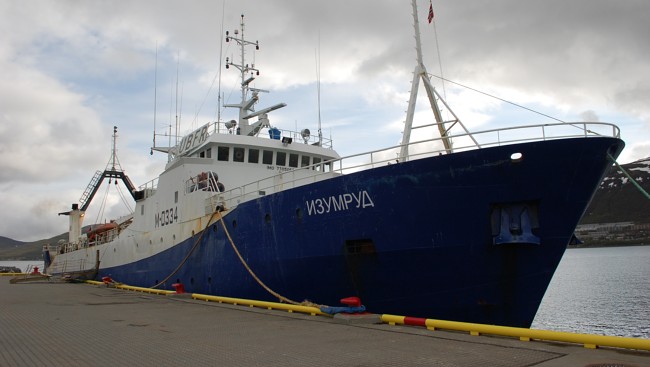
Izumrud © NRK
The Norwegian Coast Guard (Kystvakten) has detained the Russian trawler “Izumrud,” or “Emerald,” in Tromsø, Norway. A helicopter from the coast guard filmed crew members of the Izumrud illegally dumping fish over the side of the ship near the environmentally protected maritime areas around Svalbard. Members of the coast guard’s KV Senja boarded the ship to arrest its crew members and then escorted the ship a little under 500 miles to Tromsø in northern Norway.
View Svalbard and Tromsø in a larger map
A press release from the Kystvakten said,
“Dumping of fish is a serious environmental crime on which Kystvakten has a strong focus.”
(Original quote, in Norwegian: “Dumping av fisk er en svært alvorlig form for miljøkriminalitet som Kystvakten har et stort fokus på.”)
The Izumrud was detained in April 2003 outside of the islands of Magerøya near Finnmark for violating fishing rules by under-reporting its catch totals. Izumrud had 55 tons more tuna than they had claimed. Murmansk Trawler Fleet, the company which owns the ship, was fined 750,000 kroner (US $115,000). Russian newspaper RIA Novosti complains that Norway has yet to inform the Russian Embassy that the ship has been detained, which should be standard procedure.
According to the Russian Fish Company,
“The high degree of professionalism in [Murmansk Trawler Fleet’s] staff has been confirmed by ratings of the Association of Russian Managers and awards conferred by the Government.
We’ll see whether the Norwegian government confirms or denies this position.
You can read more about the Kystvakten in English here (PDF).
News links
“Russian trawler detained for illegal fishing,” RIA Novosti
“Nekter for fiskedumping,” NRK (in Norwegian)
“Russisk tråler tatt ved Svalbard,” NRK (in Norwegian)